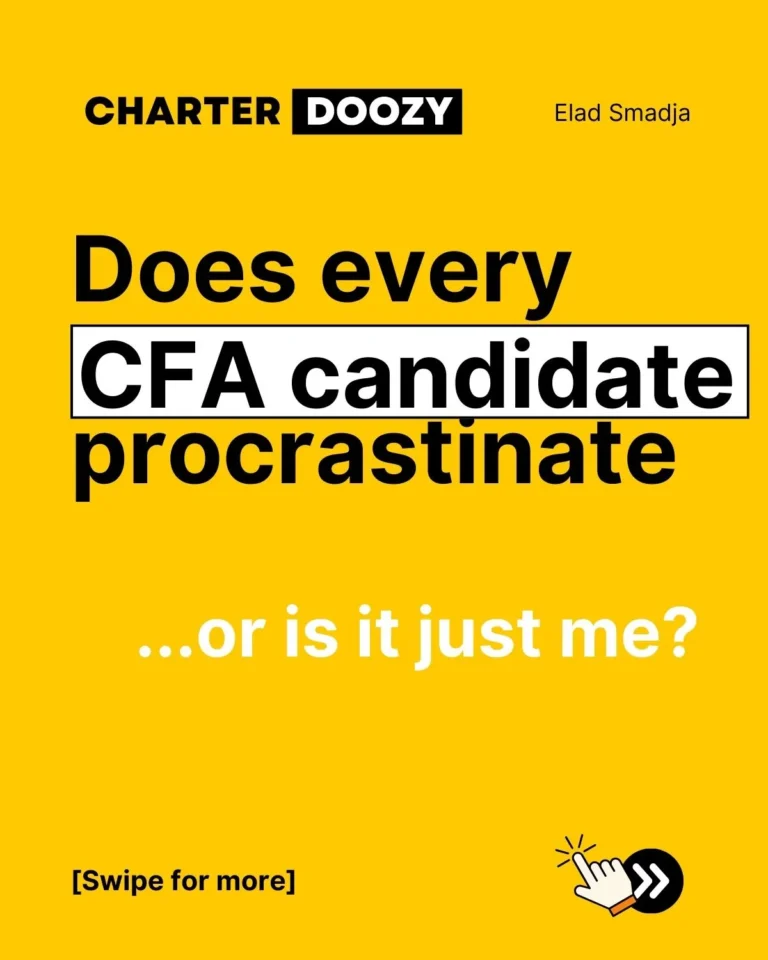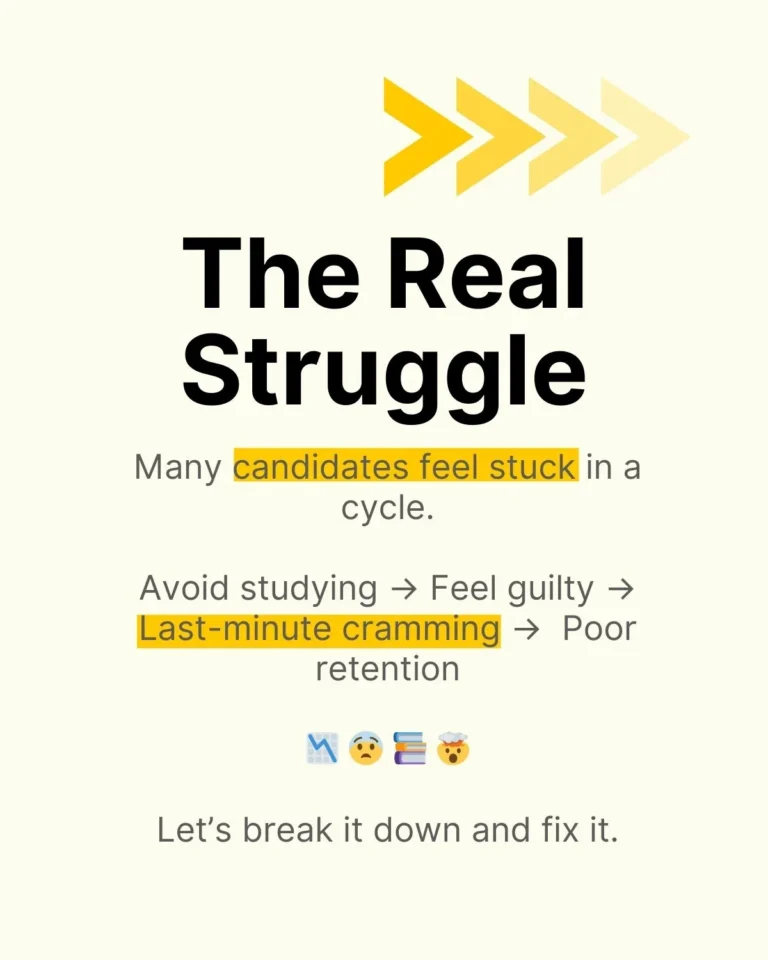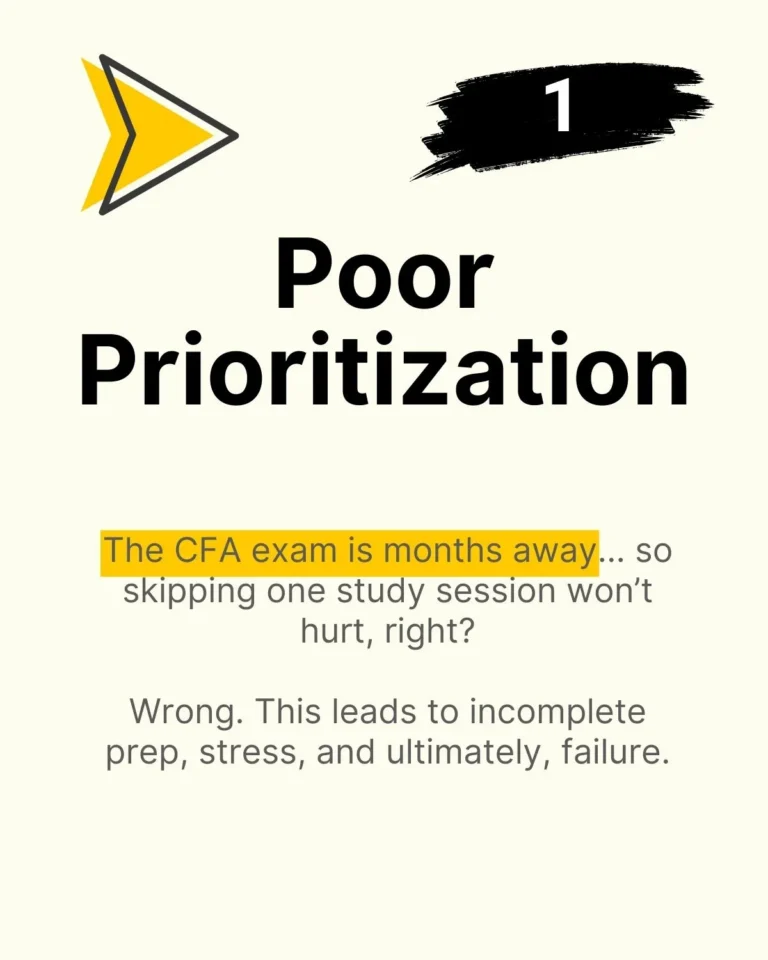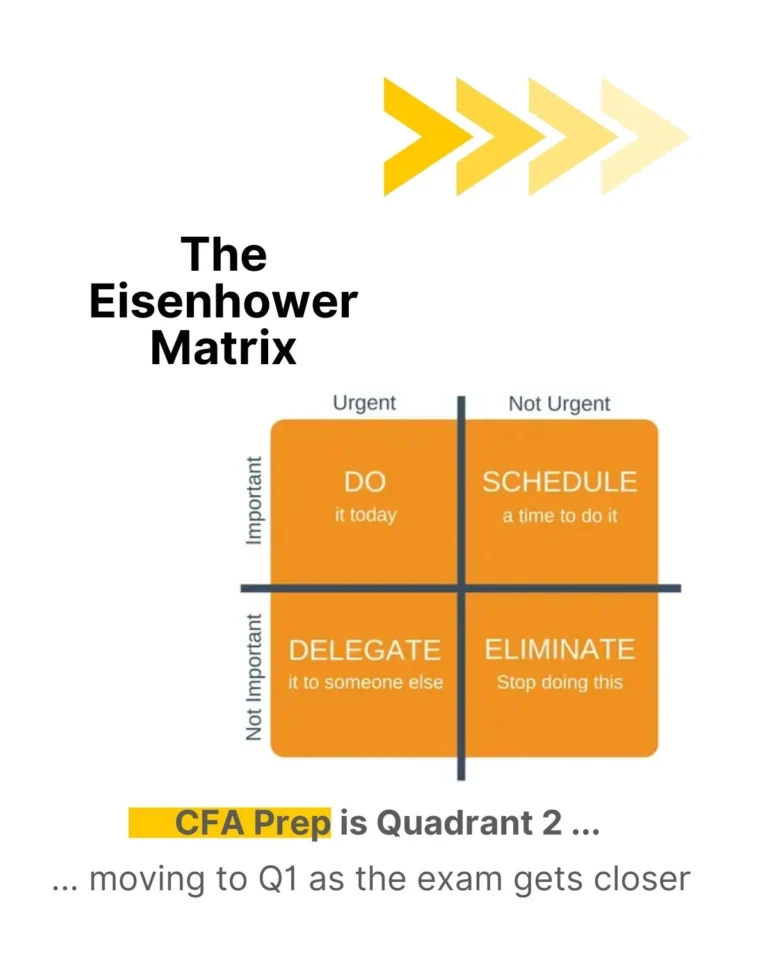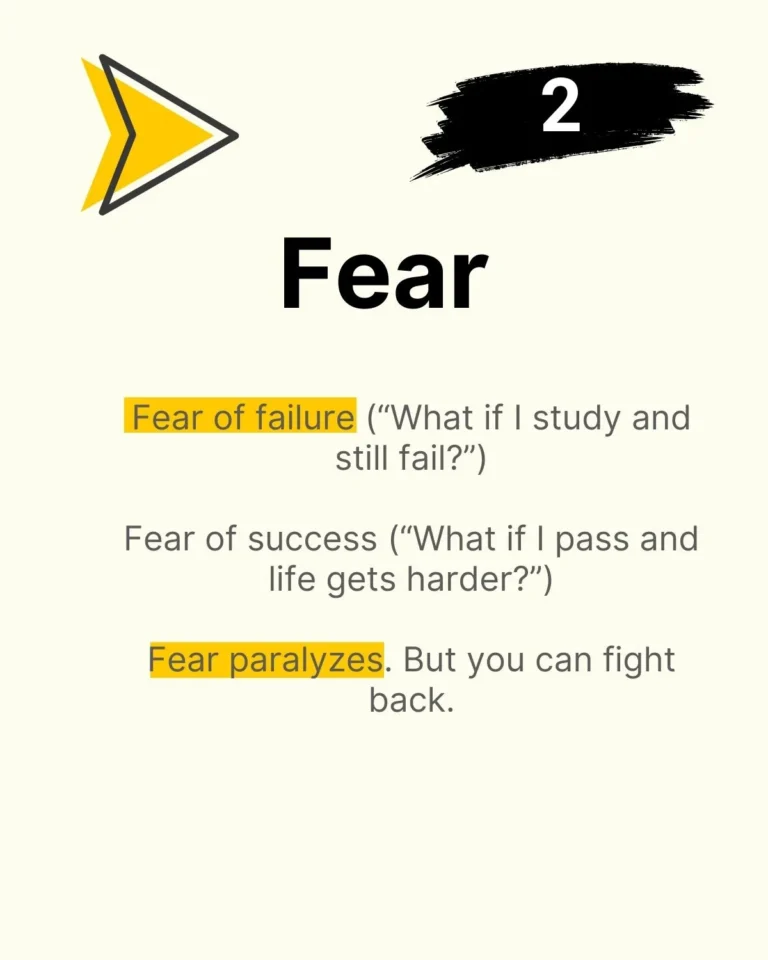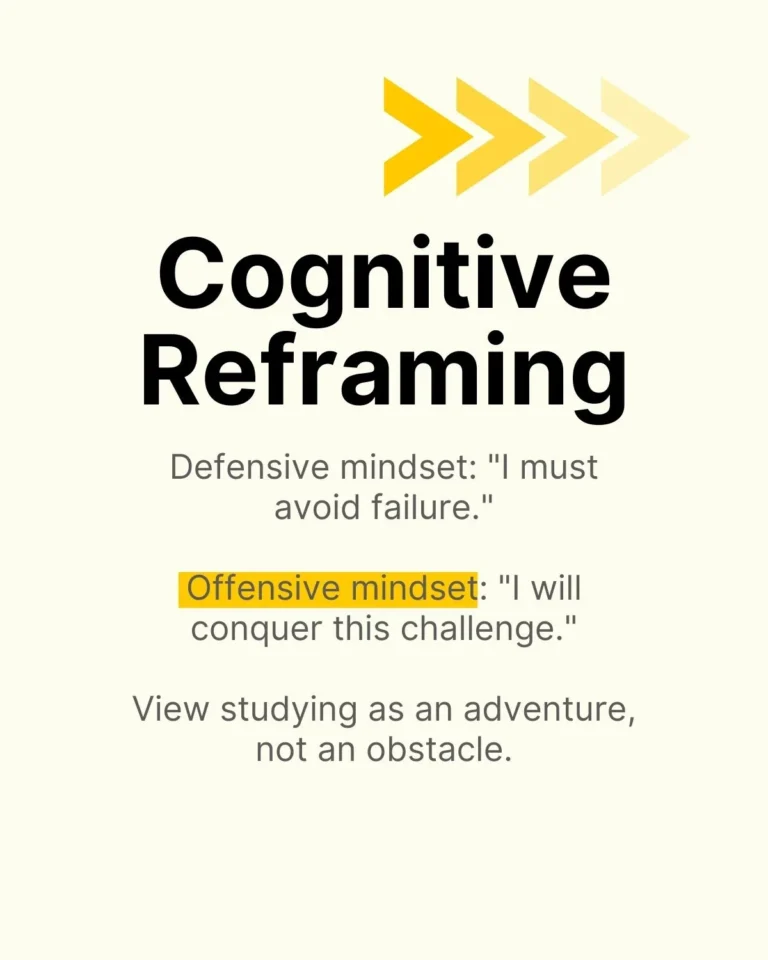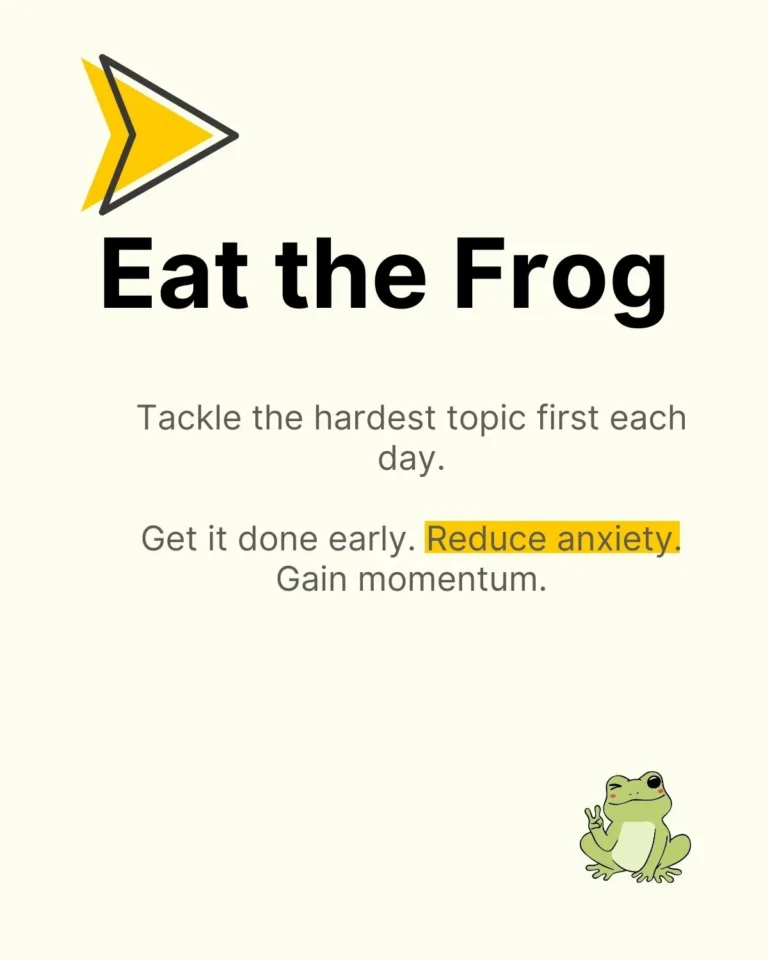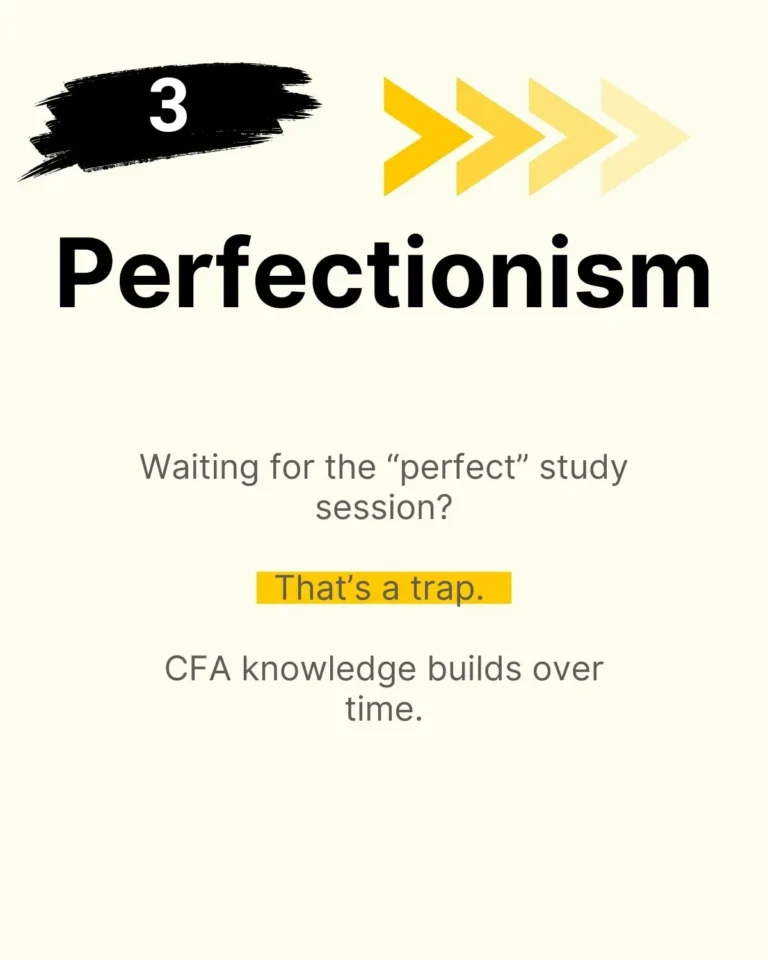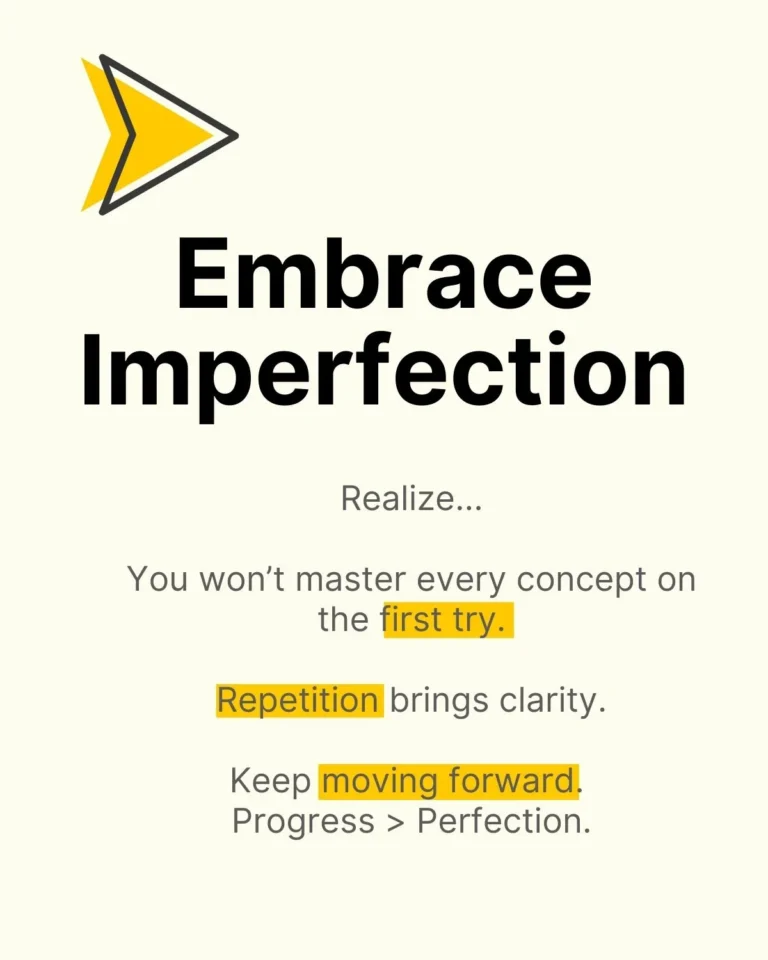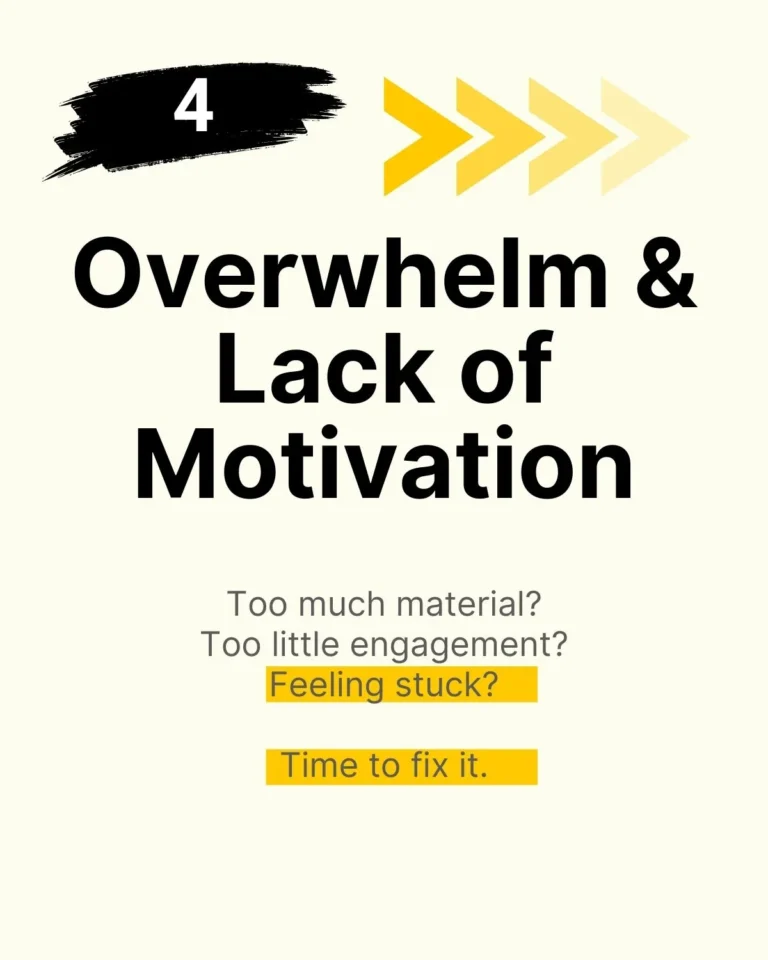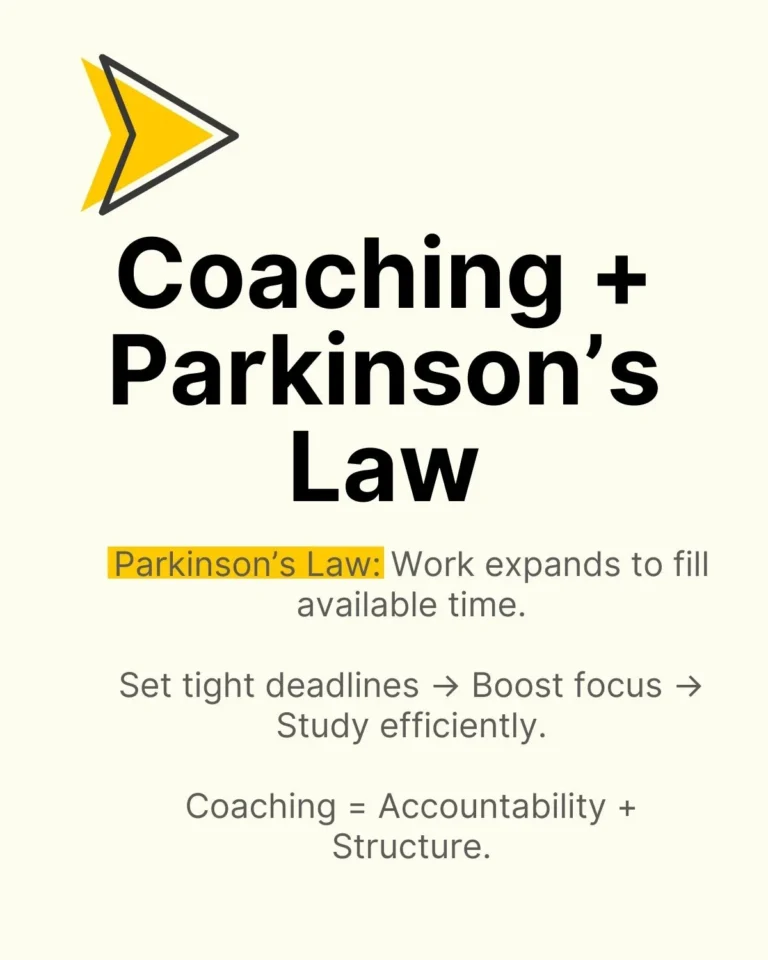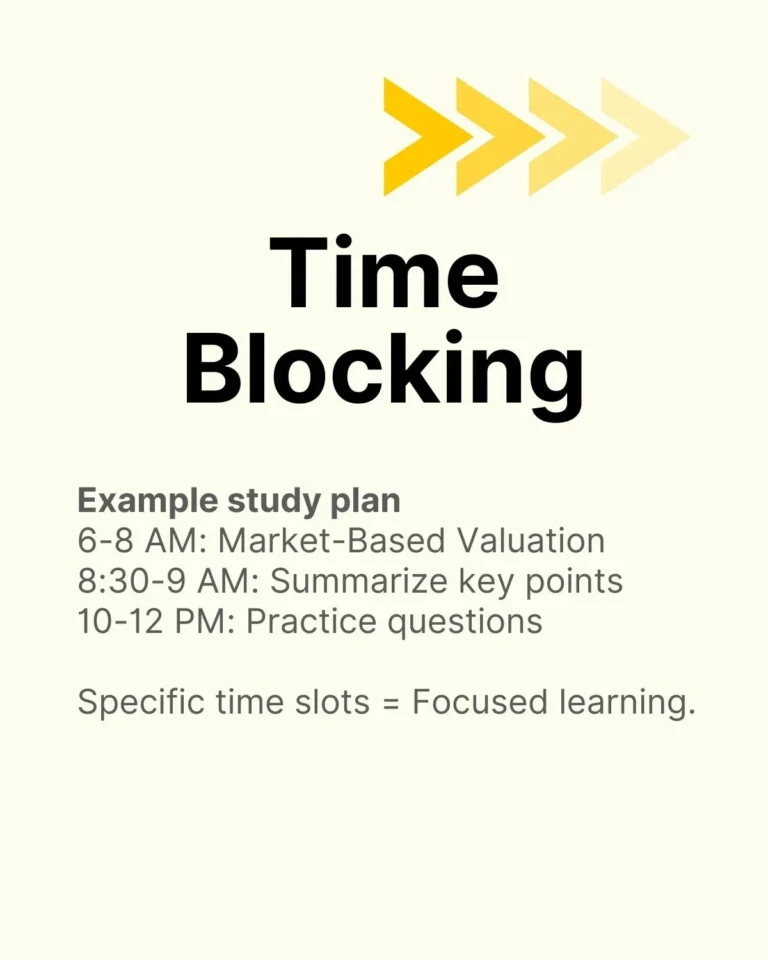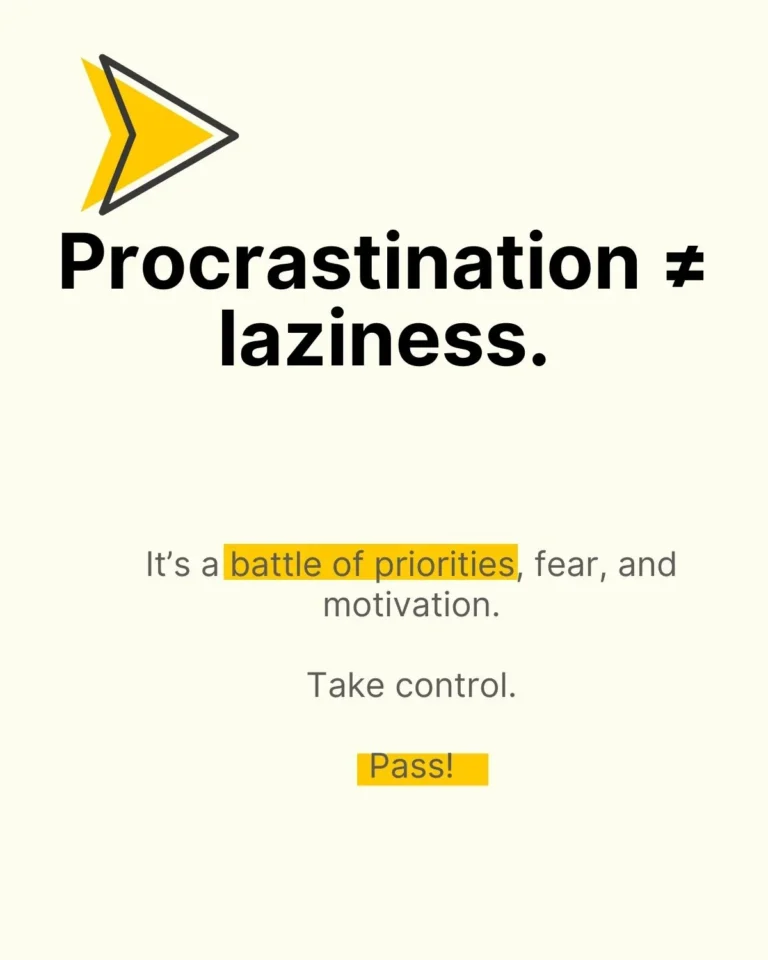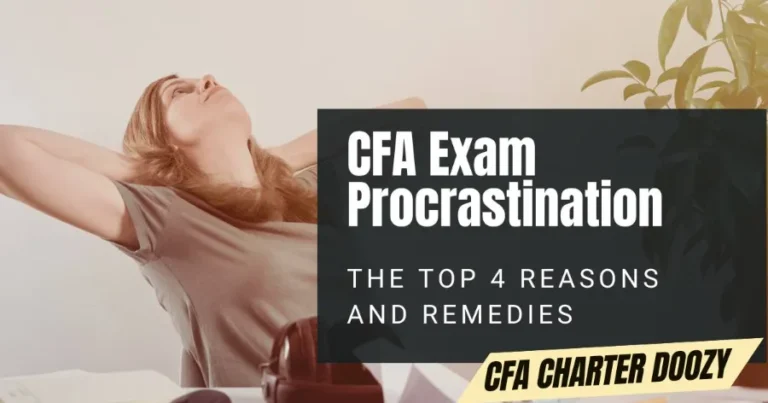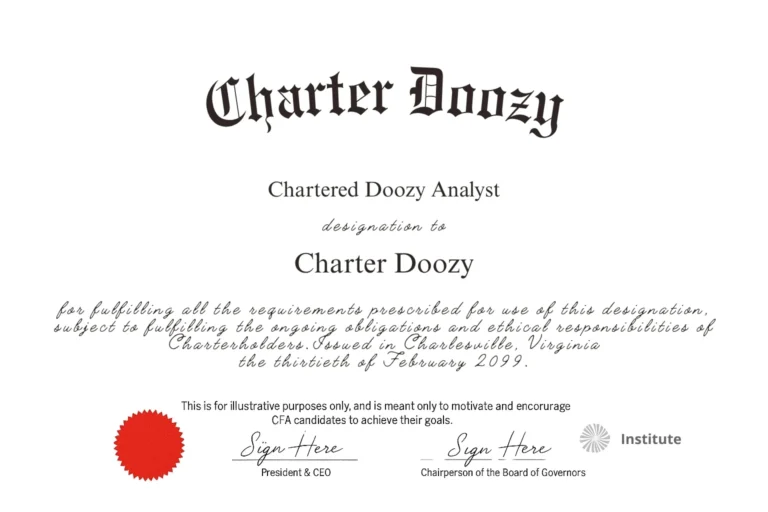A CFA candidate once explained to me her experience with procrastination in the CFA Exams as follows:
“… it’s like a growing weight that gets heavier every day… I knew I was losing [valuable study] time, but I kept putting things off, partly because of work pressure. At first, there was some relief in delaying tasks, but it quickly turned into guilt and anxiety. Even in my free time, I couldn’t relax without feeling stressed about what I wasn’t doing… As the exam date got closer, that procrastination turned into panic… The amount of material I hadn’t touched felt impossible to cover, and it was… I ended up cramming late at night, driven by fear, not real learning. This cycle of avoiding and then rushing left me struggling to remember anything and made me feel less confident… It’s confusing because I’m a high-achiever, yet I still got stuck in this loop of procrastination which only hurt my chances of success.”
(Transcribed: March 2019)
A bit dramatic? No doubt.
But procrastination is a common enemy of many CFA candidates.
It’s a trap that can derail even the most dedicated students, leading to rushed study sessions and subpar exam performance.
There is a misconception that procrastination is essentially the same as laziness.
While this may be true for some, in my experience CFA candidates are generally not lazy. They are most often ‘Type A’ personalities that are generally competitive, driven, and ambitious. Otherwise why would they be attempting the CFA Program in the first place?
So why do so many candidates struggle with stalling and hesitation in their CFA preparations?
In this article we explore 4 alternative causes of procrastination, as well as possible solutions to help you get unstuck, and on your way to CFA greatness.

CFA Procrastination Reason #1: Poor Prioritization
The CFA program is notoriously demanding. It requires a lot of preparation stretched over a long period of time. In parallel, candidates often juggle work, personal life, and studying.
This dangerous combination of long preparation times, and other urgent responsibilities can make CFA vacillation a tempting escape.
After all, if my exam is still 4 months away, is it really that bad if I miss Saturday’s study session to complete an overdue report for work?
While stalling on your CFA preparations might appear logical in the short-term, if it persists unchecked it will result in incomplete preparation, increased stress, anxiety and a sense of inadequacy.
Not to mention exam failure.
So, procrastination is not necessarily a result of laziness. It can also emanate from poor planning and prioritization.
Doozy Digest
A newsletter for CFA candidates
Subscribe for:
✔ Insightful tips
✔ Expert advice
✔ Career motivation
✔ Exam inspiration
Stay updated and subscribe today!
Response: The Eisenhower Matrix
The Eisenhower Matrix, also known as the Urgent-Important Matrix, is a simple tool for prioritizing tasks based on their urgency and importance.
It was popularized by Dwight D. Eisenhower, the 34th President of the United States, who famously said, “What is important is seldom urgent, and what is urgent is seldom important.”
The matrix helps you decide which tasks to focus on by dividing them into four quadrants.
Quadrant 1: Urgent and Important. These tasks require immediate attention and have significant consequences if not completed promptly. They are often crisis-driven or deadline-oriented.
Quadrant 2: Important but Not Urgent. These tasks are important for achieving long-term goals but don’t require immediate action.
Quadrant 3: Urgent but Not Important. These tasks demand immediate attention but have little impact on long-term goals. They are often interruptions or distractions.
Quadrant 4: Not Urgent and Not Important. These tasks are neither urgent nor important. They are often time-wasters or distractions.
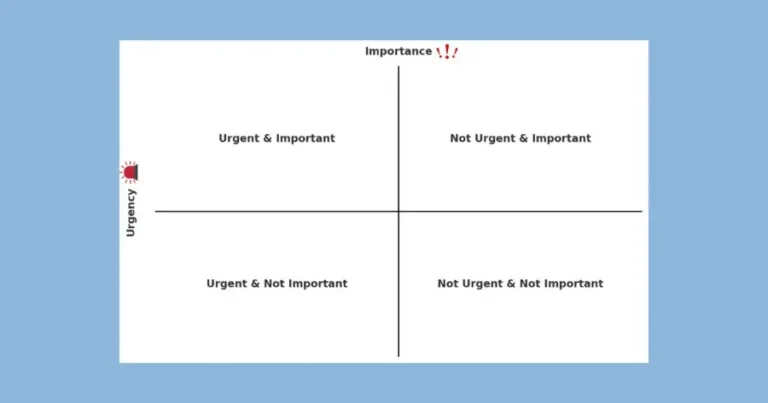
What you want to do as a CFA Candidate is eliminate (or delegate) Quadrant 3 and 4 tasks as much as possible, and reprioritize the Quadrant 2 task of preparing for your upcoming CFA exams.
The ‘urgency’ of Q3 items have a way of setting off the alarm bells in your mind.
Your mind tells you that you must go ‘put out the fires’ of a demanding boss or girlfriend/boyfriend. If you want to leave any time (or mindspace) for your exam preparations then you’ll need to find a way to not let these items suck you in.
Similarly, Q4 items are just unnecessary noise that will keep you from your dreams.
You need to identify and minimize common distractions such as social media and the fridge. Create a dedicated, distraction-free study environment which promotes maximum concentration and focus.
Reason #2: Fear
Fear is a significant cause of procrastination among CFA candidates.
It lurks beneath the surface like a leviathan, but manifests itself in the delaying tactics and dilly-dallying that many of us know all too well.
Fear of failure is common. It can paralyze candidates, making them avoid studying to protect themselves from the potential disappointment of not meeting their goals.
The fear of success, though less obvious, is also powerful.
Success can bring new challenges, expectations, and responsibilities, which can be daunting.
This fear can manifest as procrastination, as candidates may unconsciously avoid the changes that success might bring.
Both fears can lead to a cycle of inaction, where candidates delay their preparations, ultimately harming their chances of success.

Response: Cognitive Reframing
There can be many ways to tackle fear. Break down the CFA curriculum into smaller, manageable tasks to avoid overwhelm.
Start with smaller, less intimidating sections to gradually build your confidence.
Practice self-compassion, mindfulness, and flexibility with the help of a therapist, counselor or coach.
I prefer the faster and more direct approach.
You need to jump into the deep end.
You need to reframe procrastination from a defensive stance (“I need to avoid failure”) to an offensive stance (“I will conquer this challenge head-on”).
In my experience, this shift from the passive (victim mentality) to the active (conqueror mentality) empowers candidates to take control of their studies.
This shift in mindset can reduce the power of fear and foster a proactive approach to preparation.
Instead of seeing challenging tasks as threats, candidates can view them as opportunities for growth.
This reframing turns studying into a journey of adventure rather than a series of obstacles to avoid.

Eat the Frog
One of the most effective ways to shift from a defensive mindset to an offensive one is by “eating the frog”—a concept made famous by Mark Twain.
The idea is simple. If the first thing you do each day is eat a live frog, you can go through the rest of the day knowing that the worst is behind you.
In the context of CFA exam preparation, the “frog” represents the most difficult or daunting task on your to-do list.
Tackling this task first thing in the morning, or at the beginning of your study session, can set a positive tone for the rest of your day.
By addressing the hardest tasks early, you remove the weight of procrastination from your mind.
Instead of spending the day dreading what you still have to do, you gain a sense of accomplishment that fuels your momentum for other tasks.
This proactive approach not only helps reduce anxiety but also builds your confidence, allowing you to face the rest of your study schedule with a clearer mind.
Moreover, completing the most challenging tasks first helps to minimize the mental clutter that can accumulate when you procrastinate.
By “eating the frog,” you free up mental energy and focus, making it easier to handle the rest of your study material with greater efficiency and clarity.

Reason #3: Perfectionism
Perfectionism often leads candidates to set impossibly high standards for themselves.
The fear of not meeting these standards can result in what’s commonly known as “paralysis by analysis” – spending more time planning and overanalyzing than actually doing.
This mindset can be particularly harmful when preparing for the CFA exams, where steady progress is essential to cover the extensive curriculum.
I’ve seen this rigidity manifest in certain candidates who struggle with the idea that they might not fully grasp every concept in the Candidate Body of Knowledge (CBOK) on the first pass.
They become uncomfortable with the notion of incomplete understanding, which can stall their progress.
Here’s the reality: Sometimes, concepts only start to make sense after the third or fourth review.
In other cases, revisiting a later section can suddenly bring clarity to an earlier idea.
You need to embrace a certain level of imperfection as you build your knowledge and skills over time.

Reason #4: Overwhelm, Boredom and Lack of Motivation
The sheer volume of material in the CFA curriculum can be overwhelming.
When faced with such a massive task, it’s easy to feel as though it’s too much to handle.
This sense of being overwhelmed often leads to procrastination, as a way to avoid the stress and anxiety of tackling such a significant challenge.
Additionally, some candidates may find certain sections of the curriculum less engaging or downright tedious.
When you’re not emotionally or intellectually invested in the material, it becomes easy to push those topics aside, further fueling procrastination.
This lack of engagement can also drain your motivation, especially if the rewards of passing the exams feel distant or uncertain.
All of the above can manifest in a decline in your internal motivation. A diminishing ‘fire’ to tackle your daily study routine.
While a day or two of low energy is normal, a prolonged lack of motivation—especially if you’re otherwise healthy—can be a clear sign that you’re struggling emotionally.
Response: Coaching
When you’re stuck in your own thoughts and struggles, it can be hard to see a clear way forward.
The internal dialogue that fuels procrastination often becomes a cycle that’s tough to break.
This is where coaching can be very helpful.
A skilled coach offers an objective, outside perspective that can help you see through the mental fog.
They aren’t emotionally involved in your challenges, so they can spot solutions and opportunities you might miss.
Their experience with the CFA program also allows them to provide strategies that fit your strengths and weaknesses.
Parkinson’s Law
One effective technique a coach might use is Parkinson’s Law.
Parkinson’s Law states, “Work expands to fill the time available for its completion.”
This principle, described by a 1955 naval historian with the same name, highlights the relationship between time-management and productivity. It reveals why tasks often take longer than necessary to complete.
Understanding and leveraging Parkinson’s Law can be a game-changer for CFA candidates struggling with procrastination.
What Parkinson’s Law suggests is that The more time you allocate to a task, the longer it will likely take, often due to delays and inefficiencies.
You’ve probably seen this at work.
If your boss gives you 24 hours to complete a report, you find a way to make it happen.
But if the deadline is a month away, most people drag it out, often finishing at the last minute.
There’s a certain energy and focus that time pressure creates.
And this can be just as effective in your CFA exam preparations.

A good coach will help create this sense of urgency by breaking the CFA curriculum into smaller sections and setting shorter, realistic, but challenging deadlines.
This strategy encourages more focused and efficient study sessions while preventing the overwhelming feeling of facing the entire syllabus at once.
Another effective technique is ‘Time Blocking’.
Instead of vaguely setting aside a weekend to study, time blocking involves scheduling specific periods for mastering particular sections.
This method narrows your focus, keeping your mind on a single task at a time, reducing the chance of distraction.
Here’s an example from one of our recent coaching clients:
Sunday, 10 March
6:00 AM – 8:00 AM: Study Market-Based Valuation: Price and Enterprise Value Multiples
8:30 AM – 9:00 AM: Review and summarize key points
10:00 AM – 12:00 PM: Practice questions on Guidance for Standards I–VII
Or this one for a candidate who was closer to the exam date:
Saturday, 4 May
1:00 PM – 3:00 PM: Take a full-length practice exam
4:00 PM – 6:00 PM: Review practice exam answers and identify weak areas
7:00 PM – 9:00 PM: Study weaker topics identified from the practice exam
A structured schedule like this will keep you focused, productive, and on track.
Putting it into Practice
Let’s take the example of our client John (name changed for privacy), a 28-year-old analyst working at a bank outside London.
Despite his supposed strong desire to pass the CFA Level II Exam, John found himself constantly procrastinating.
The pressure of juggling work and study left him unfocused.
Eventually panic started to set in.
This panic only fueled more procrastination, creating a vicious cycle.
John eventually reached out to us, sharing his concerns: “I feel overwhelmed and keep pushing out my study sessions to the last minute,” he admitted. “I know I need to study, but I just can’t seem to get started.“
We worked with John to pinpoint the root issues—lack of structure, an unclear plan, and fear of getting started. Instead of focusing on the overwhelming big picture, we guided him to take things step by step.
We introduced him to time blocking and helped him create a detailed study schedule, with a commitment to check in after two weeks.
As we explained to him, we need to break down the study material into manageable chunks and set specific times for each session. This created a sense of urgency which helped create focus.
Within just a few days, John began to see significant improvements. As he met his hourly and daily goals, he started building momentum.
“I can’t believe how much more productive I’ve become,” John reported. “Knowing that you’ll check in on me keeps me motivated to stick to the schedule. The time blocking really helps me stay focused, and I’m finally making consistent progress.”
With each small victory, John’s confidence grew, and the positive momentum began to take over.

Final Thoughts
Procrastination is a formidable challenge for many CFA candidates. But it’s not an insurmountable one.
By understanding the underlying reasons—whether it’s poor prioritization, fear, perfectionism, or overwhelm—you can take meaningful steps to overcome it.
Tools like the Eisenhower Matrix, cognitive reframing, and time blocking, combined with the guidance of a skilled coach, can help you break free from the cycle of procrastination.
Remember, success in the CFA program isn’t just about intelligence or dedication. It’s also about strategy and execution.
By addressing procrastination head-on and implementing these strategies, you can build the momentum needed to approach your studies with confidence and clarity.
Each small victory will reinforce your progress, setting you on the path to achieving your CFA goals.
Stay focused, stay disciplined, and take control of your journey to CFA success.
